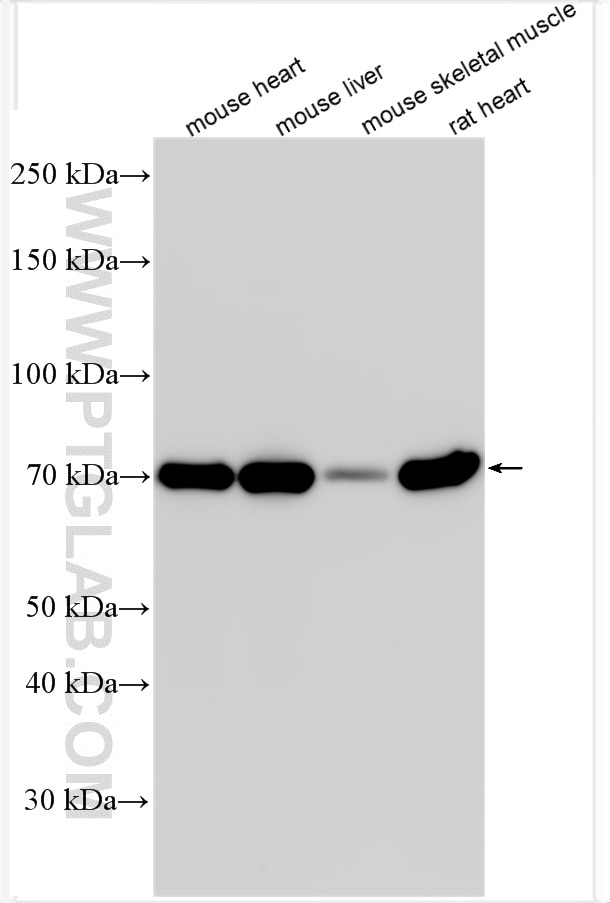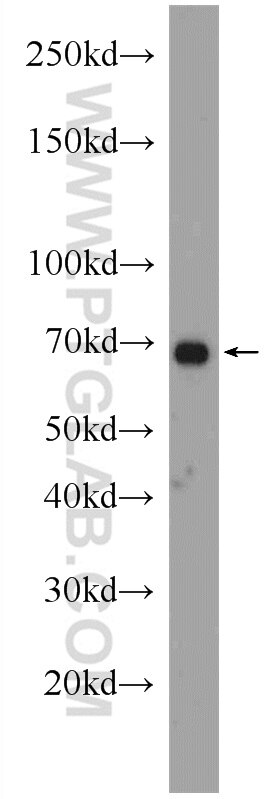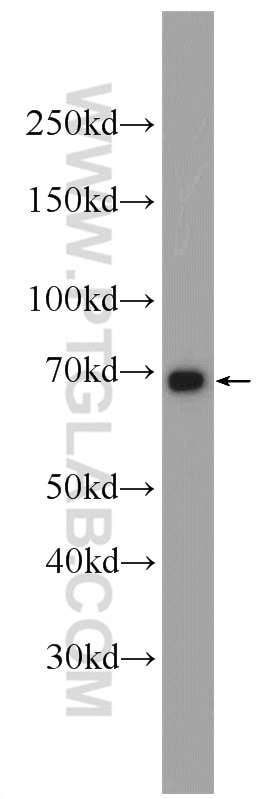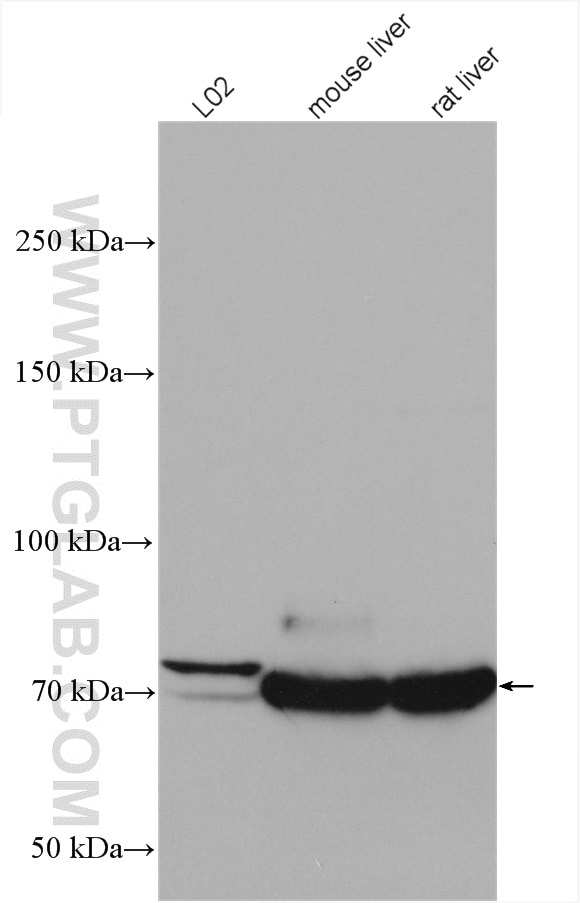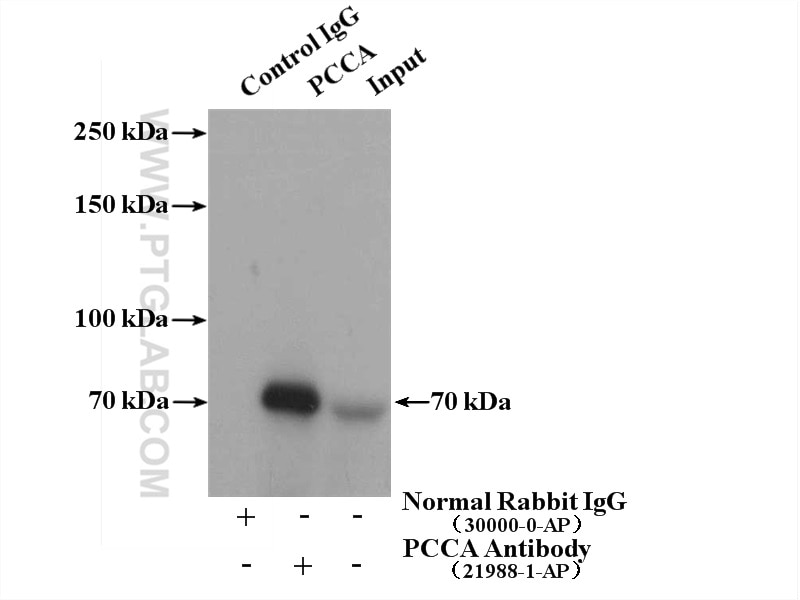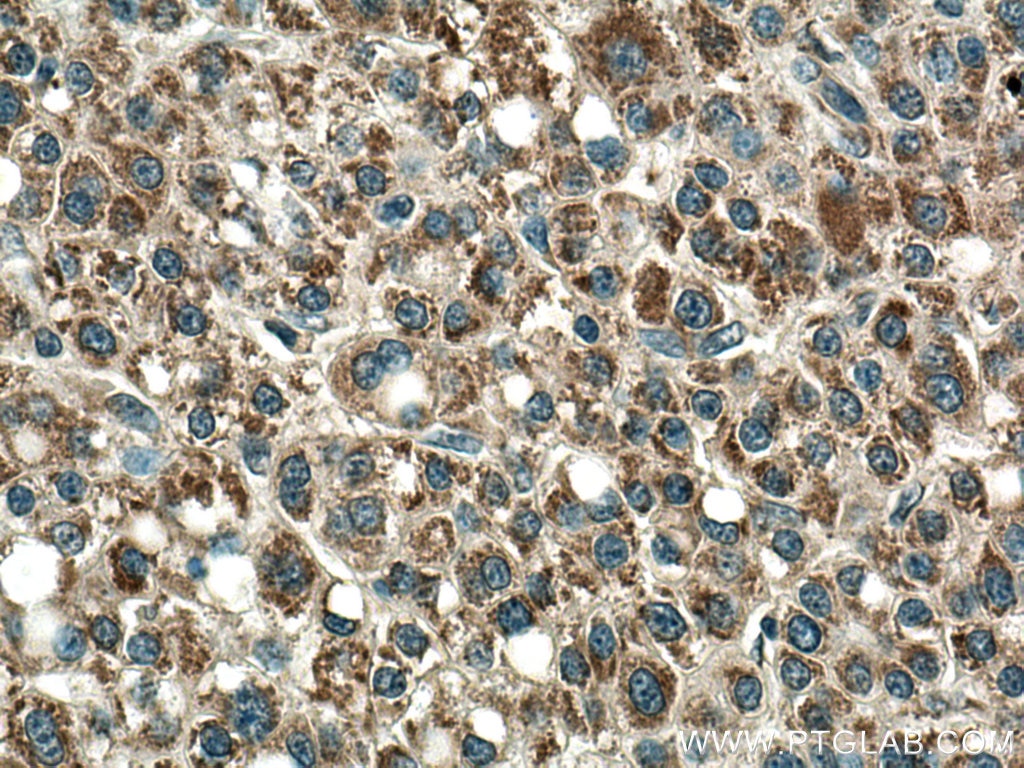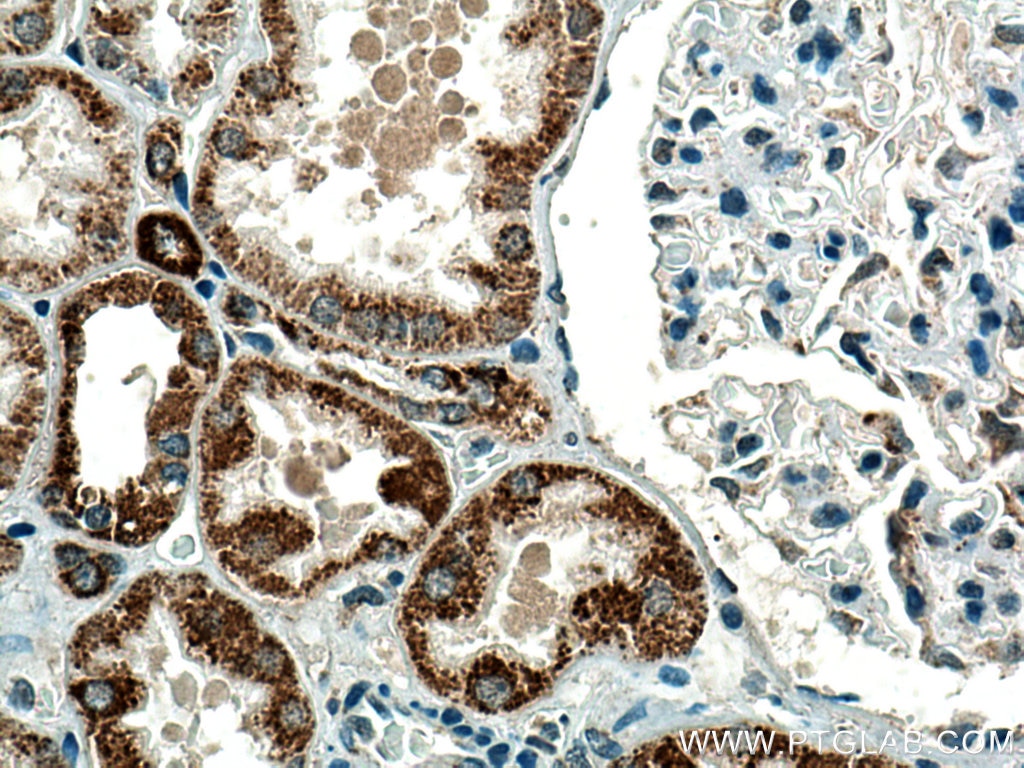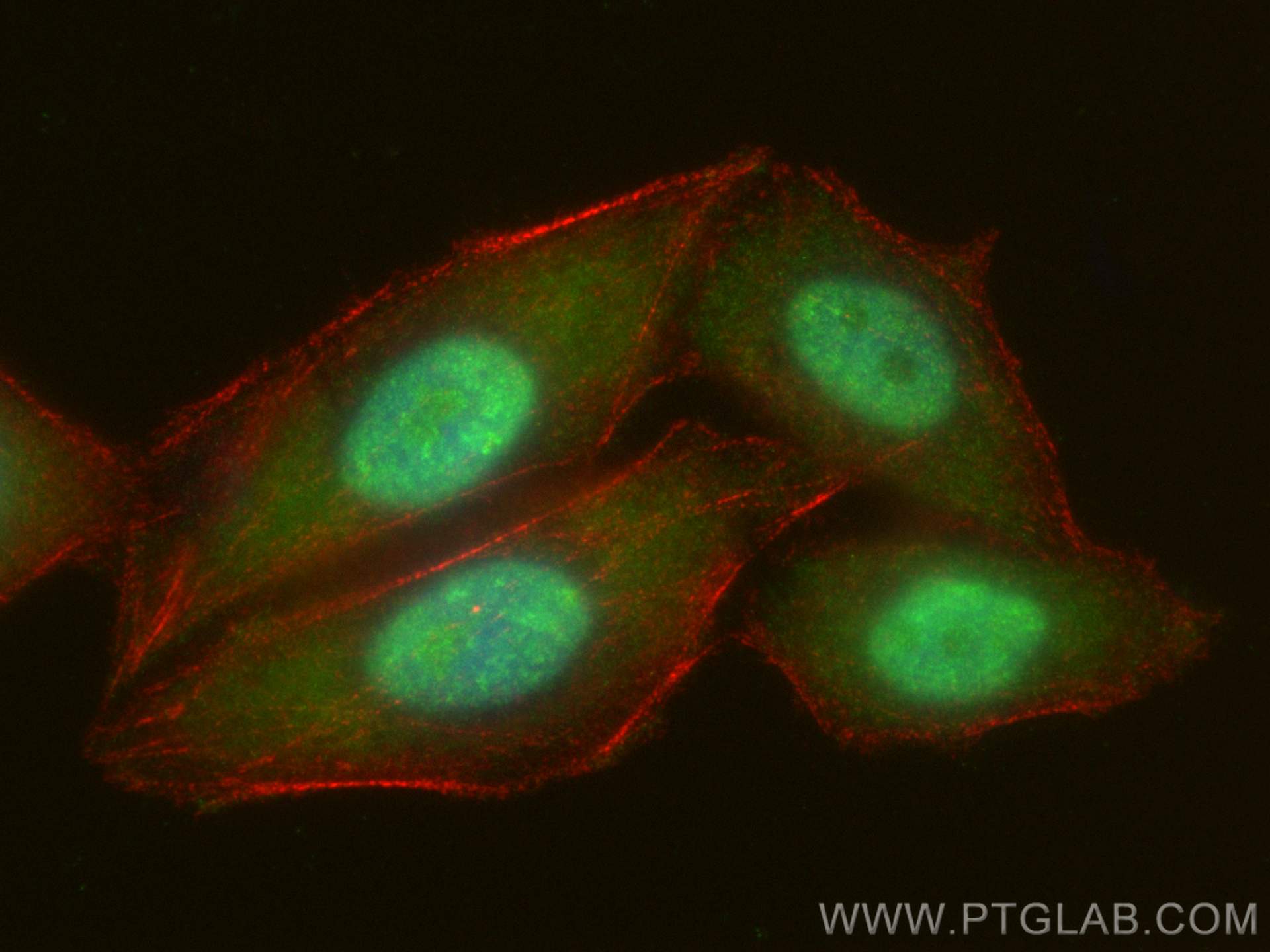Anticorps Polyclonal de lapin anti-PCCA
PCCA Polyclonal Antibody for WB, IP, IF, IHC, ELISA
Hôte / Isotype
Lapin / IgG
Réactivité testée
Humain, rat, souris
Applications
WB, IHC, IF/ICC, IP, ELISA
Conjugaison
Non conjugué
N° de cat : 21988-1-AP
Synonymes
Galerie de données de validation
Applications testées
| Résultats positifs en WB | tissu cardiaque de souris, cellules L02, cellules NIH/3T3, tissu de muscle squelettique de souris, tissu hépatique de rat, tissu hépatique de souris |
| Résultats positifs en IP | cellules L02 |
| Résultats positifs en IHC | tissu de cancer du foie humain, tissu rénal humain il est suggéré de démasquer l'antigène avec un tampon de TE buffer pH 9.0; (*) À défaut, 'le démasquage de l'antigène peut être 'effectué avec un tampon citrate pH 6,0. |
| Résultats positifs en IF/ICC | cellules HepG2, |
Dilution recommandée
| Application | Dilution |
|---|---|
| Western Blot (WB) | WB : 1:1000-1:8000 |
| Immunoprécipitation (IP) | IP : 0.5-4.0 ug for 1.0-3.0 mg of total protein lysate |
| Immunohistochimie (IHC) | IHC : 1:50-1:500 |
| Immunofluorescence (IF)/ICC | IF/ICC : 1:50-1:500 |
| It is recommended that this reagent should be titrated in each testing system to obtain optimal results. | |
| Sample-dependent, check data in validation data gallery | |
Applications publiées
| WB | See 7 publications below |
| IF | See 2 publications below |
Informations sur le produit
21988-1-AP cible PCCA dans les applications de WB, IHC, IF/ICC, IP, ELISA et montre une réactivité avec des échantillons Humain, rat, souris
| Réactivité | Humain, rat, souris |
| Réactivité citée | Humain, souris |
| Hôte / Isotype | Lapin / IgG |
| Clonalité | Polyclonal |
| Type | Anticorps |
| Immunogène | PCCA Protéine recombinante Ag17271 |
| Nom complet | propionyl Coenzyme A carboxylase, alpha polypeptide |
| Masse moléculaire calculée | 80 kDa |
| Poids moléculaire observé | 70 kDa |
| Numéro d’acquisition GenBank | BC000140 |
| Symbole du gène | PCCA |
| Identification du gène (NCBI) | 5095 |
| Conjugaison | Non conjugué |
| Forme | Liquide |
| Méthode de purification | Purification par affinité contre l'antigène |
| Tampon de stockage | PBS avec azoture de sodium à 0,02 % et glycérol à 50 % pH 7,3 |
| Conditions de stockage | Stocker à -20°C. Stable pendant un an après l'expédition. L'aliquotage n'est pas nécessaire pour le stockage à -20oC Les 20ul contiennent 0,1% de BSA. |
Informations générales
Propionyl-CoA carboxylase (PCC) catalyzes the biotin-dependent carboxylation of propionyl-CoA to D-methyl-malonyl CoA, a reaction that occurs in the mitochondrial matrix. PCC is involved in the catabolism of several essential amino acids (methionine, isoleucine, threonine and valine), as well as odd chain fatty acids and cholesterol. Deficiency of PCC results in propionic acidemia, a metabolic disorder characterized by severe metabolic ketoacidosis, vomiting, lethargy and hypotonia. PCC consists of nonidentical subunits (α and β) encoded by different genes (PCCA and PCCB, respectively). The αPCC cDNA contains an open reading frame of 2106 nucleotide bases and codes for a 702 amino acid polypeptide. The mature length subunit is 70 kDa and contains the biotin binding site.(PMID:8852656). This protein has 3 isoforms produced by alternative splicing with the molecular weight of 80 kDa, 77 kDa and 75 kDa. The full length protein has a transit peptide with 52 amino acids which will be removed in mature form. This antibody is specific to PCCA.
Protocole
| Product Specific Protocols | |
|---|---|
| WB protocol for PCCA antibody 21988-1-AP | Download protocol |
| IHC protocol for PCCA antibody 21988-1-AP | Download protocol |
| IF protocol for PCCA antibody 21988-1-AP | Download protocol |
| IP protocol for PCCA antibody 21988-1-AP | Download protocol |
| Standard Protocols | |
|---|---|
| Click here to view our Standard Protocols |
Publications
| Species | Application | Title |
|---|---|---|
Nat Commun Dual mRNA therapy restores metabolic function in long-term studies in mice with propionic acidemia. | ||
J Cell Biol CLUH regulates mitochondrial metabolism by controlling translation and decay of target mRNAs. | ||
Mol Genet Metab Metabolic perturbations mediated by propionyl-CoA accumulation in organs of mouse model of propionic acidemia. | ||
Hum Gene Ther Effects of Adeno-associated Virus Serotype and Tissue-specific Expression on Circulating Biomarkers of Propionic Acidemia. | ||
Hum Gene Ther Long-term Sex-Biased Correction of Circulating Propionic Acidemia Disease Markers by Adeno-Associated Virus Vectors. | ||
Biology (Basel) In Situ Peroxidase Labeling Followed by Mass-Spectrometry Reveals TIA1 Interactome. |
